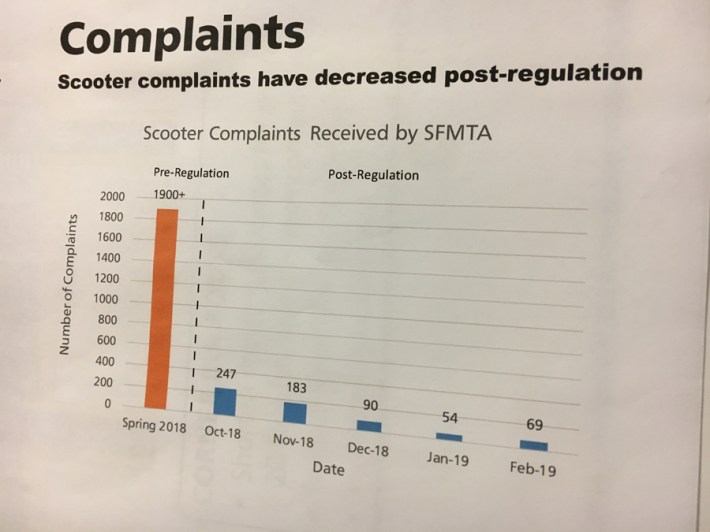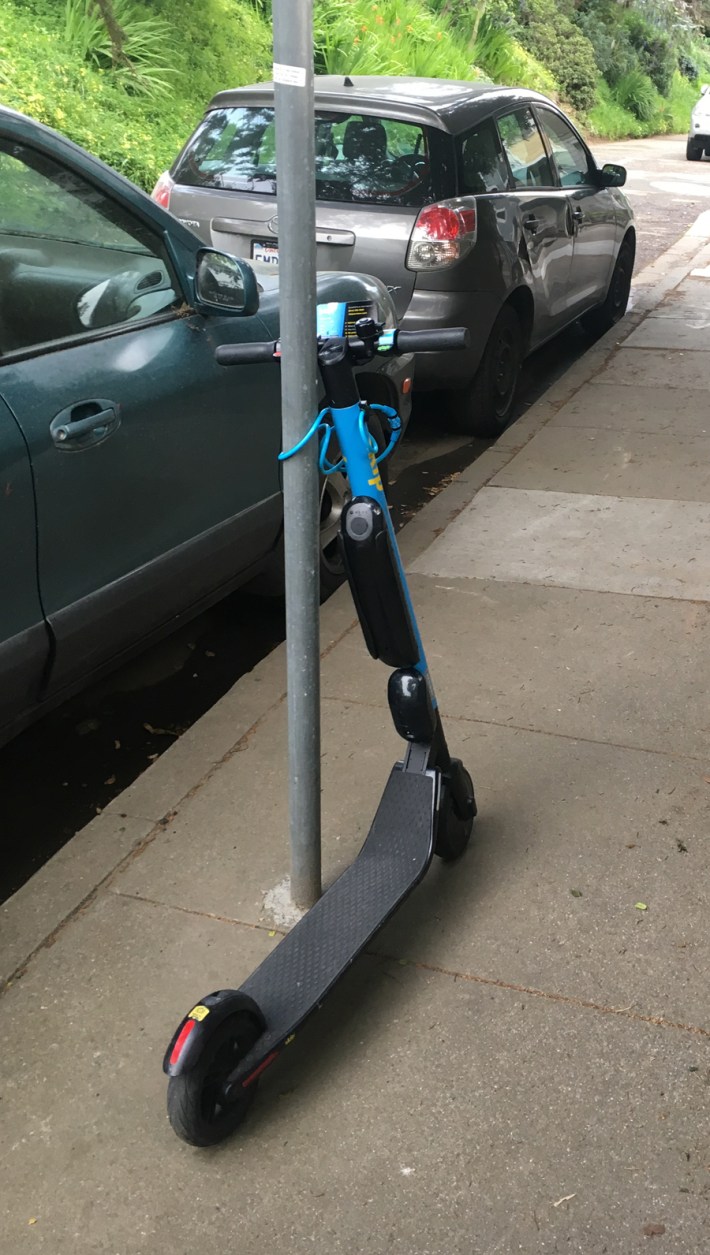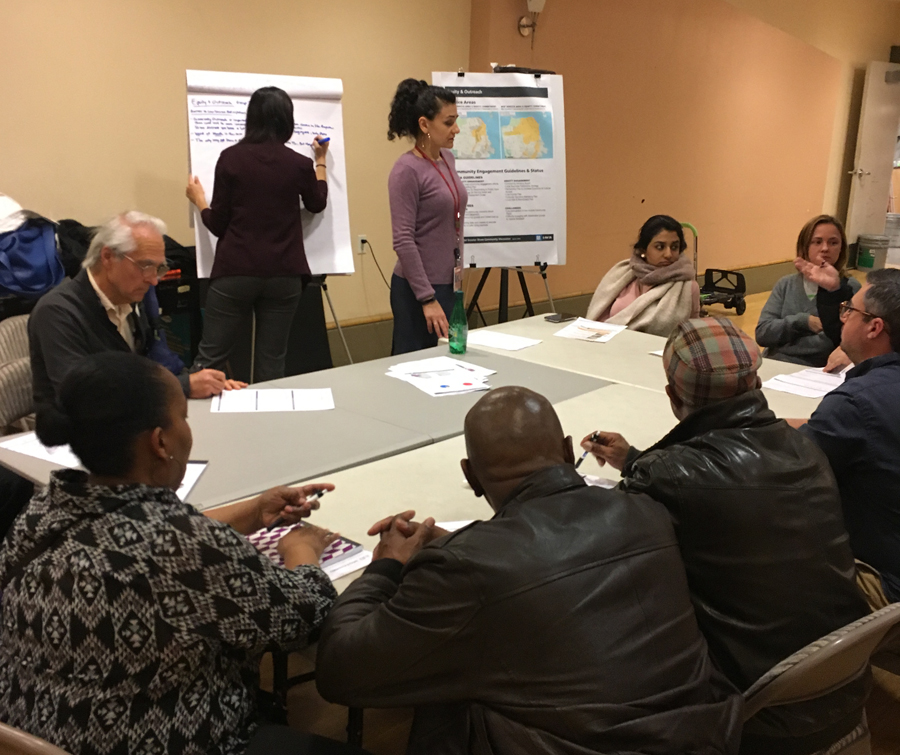For anyone who thought that dockless scooters were a small or passing fad in U.S. cities, the recent NACTO report on micromobility [PDF] has put that notion to rest. In 2018, the first full year that scooter sharing existed (Bird launched in Santa Monica in the fall of 2017), a whopping 38 million scooter rides were taken. This eclipsed the total number of station-based bike-share trips for the year, despite its existing in its current form domestically for at least nine years. Scooter sharing is scaling at rates faster than nearly any transportation innovation, including ride-hail companies such as Uber and Lyft.
Cities have begun regulating these rapidly proliferating vehicles in a variety of ways, including imposing caps on the number of scooters allowed by each operator, speed limits, designated parking zones, and permit systems that include fees and taxes. In this vein, San Francisco stands out among its peers for the deliberate process it has taken to legalize scooter sharing. After demanding that all the scooters dropped on the street without permission be removed, the city created a permit system and awarded two of them, to Skip and Scoot. Other cities have avoided this altogether by simply banning dockless scooters (or refusing to update their regulations to allow them).
This latter response has angered the growing legion of micromobility advocates (myself included), because scooters are a low-speed, emissions-free, fun transportation mode that not only fills in gaps in existing transit, but also can replace car trips altogether. This is particularly the case for trips under two miles long--which make up more than a third of car trips. For scooters to be banned while polluting cars continue to grow their share of the state’s overall greenhouse-gas emissions is enough to frustrate any environmentalist, but it is even more egregious given scooters are quieter, pose less of a risk to pedestrians, and require a fraction of the space needed for parking.
It is within this context that A.B. 1112, a proposed legislative update to California’s vehicle code relating to the regulation of dockless scooters and bikes, can be seen as a problem. The bill – introduced by Laura Friedman, who represents parts of L.A. – has passed the Assembly and is now being considered in the State Senate. The primary change that A.B. 1112 makes is to clarify what kind of data on scooters and bike-share a municipality can require of operators, and what data are off limits. If passed, the bill would only allow cities to require aggregated trip data that has been de-identified (without origins, destinations, or trip times). This is a significant constraint compared to the data some cities receive today. For example, San Francisco’s sole current dockless bike-sharing permit [PDF] (held by Uber’s JUMP Bikes) requires operators to provide the city with a real-time data dashboard, indicating the location of all active bikes in the system as well as the traces of individual trips. This granular level of data-sharing would no longer be allowed under A.B. 1112, even though nothing so far in the brief history of dockless mobility has indicated that cities have misused such information. Meanwhile, the significant issues caused by ride-hail companies – increased congestion, decline in transit use, distracted driving and double parking that endangers bike riders – have been difficult to quantify because similar data has been withheld.

While others have wisely pointed out that limiting the data cities can collect blunts their ability to learn from travel patterns and respond with new infrastructure such as more protected lanes or scooter parking, perhaps the most devastating part of this bill is the clause regarding operating “at cost.” Currently, San Francisco requires that all of its permitted bike and scooter systems – which currently include Ford GoBike, JUMP, Skip, and Scoot – offer a discounted membership program for qualifying individuals. These programs generally ask for proof of low-income (for example, participation in existing programs such as discounted power from PG&E), and provide either a reduced per-trip price or a lower-price monthly or annual membership. Critically, A.B. 1112 would prevent cities from mandating that such services be provided. It states:
In regulating shared mobility devices and providers, a local authority shall not impose any unduly restrictive requirement on a provider, including requiring operation below cost...
While operators would be free to maintain these programs on their own, it’s not hard to forecast that some of those that exist today would be jettisoned, or at least not promoted to the degree they are now, particularly as competition heats up between the growing number of operators.
Indeed, the likely decline of low-income discount programs illustrates A.B. 1112’s broader problem; it undermines the good work that is taking place in many cities regarding micromobility regulation in California. Santa Monica has pioneered the use of public rights of way for bike and scooter parking, Santa Cruz has allowed JUMP Bikes to operate in a hybrid way (bikes can be parked both at fixed docks and at regular bike racks), and San Francisco has proven that requiring bikes and scooters to have locking mechanisms significantly reduces sidewalk clutter and related complaints/citations. These practices were the products of healthy dialogues between operators and municipalities, and represent a reasonable balance between regulation and innovation.

In April, the San Francisco Municipal Transportation Agency held a public meeting on dockless scooters that showcased the value of a governmental role in this sector. Attendees from a wide range of neighborhoods were able to share their feedback on how scooters had affected life in the city to date, from Bayview residents gratified that Scoot had maintained a presence in their neighborhood to a person with mobility impairment explaining how her ability to freely use the sidewalk had been diminished. Not only were SFMTA staff present to lead the discussions and take notes, but representatives from both Skip and Scoot attended as well, listening to the concerns voiced and interjecting with clarifying questions when appropriate. This was meaningful transportation planning in action, and is only possible because San Francisco maintains the ability to manage the scooters on its roadways with a high level of specificity.
Of course, San Francisco's regulation had some hiccups – early vehicle caps were too low, and geographic service areas too small – but SFMTA has proceeded patiently and avoided a rollout that could have turned public opinion sharply against these vehicles. This is not hypothetical; one multi-city survey of scooter perceptions taken before SFMTA established its permit system found that San Francisco respondents gave the lowest approval ratings to scooters of any city included.
While there are others who have more eloquently weighed in on the pros and cons of the Mobility Data Specification (MDS), a new standard for sharing micromobility data between operators and cities that is at risk if A.B. 1112 is signed into law, the primary critique of the bill is that it shifts the regulatory balance too far toward the private sector. That will reduce the ability of cities to tailor scooter regulations to their communities and to understand how these vehicles are being used.
As the State Senate reviews this legislation, I recommend three key changes:
- First, the “below cost” prohibition clause must be removed in order to protect low-income discount programs requirements, a vital and so-far successful policy tool to ensure new modes are accessible to all.
- Second, the bill must include far more detail on what it means for cities to be prohibited from regulating dockless scooters or bikes with any requirements “more restrictive to those applicable to riders of personally owned similar transportation devices.” The vagueness in this clause is deeply unsettling; would it block San Francisco’s successful locking requirement? Would it prevent cities from mandating the removal of broken or damaged scooters left at racks? The time to flesh out the meaning and intent of this bill is now, not after it becomes law and lawsuits are filed.
- Finally, there must be a reconsideration of the data-sharing component, which in its current form would pre-emptively terminate an important experiment in how scooter and bike data can be captured and appraised for mutual public-private benefit.
It is far too soon in our embryonic dockless-mobility experience to hamstring municipal regulation. Rather, let us hope this bill is simply the starting point for a more nuanced and productive step forward.
Marcel E. Moran is a PhD student in the department of city and regional planning at UC Berkeley, where his research focuses on urban transportation, municipal regulation, and the spatial provision of new mobility technologies.






